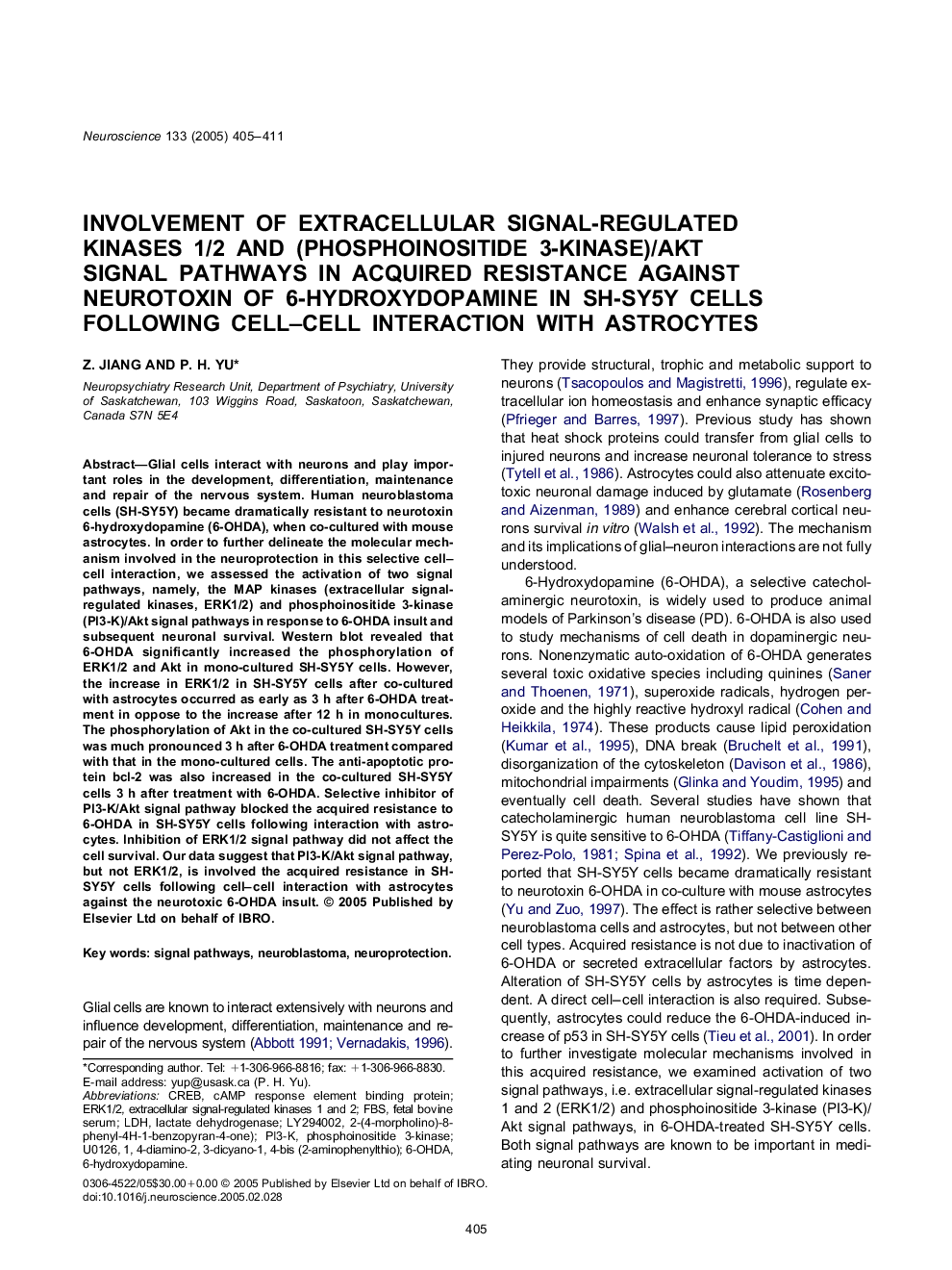| کد مقاله | کد نشریه | سال انتشار | مقاله انگلیسی | نسخه تمام متن |
|---|---|---|---|---|
| 9425406 | 1295869 | 2005 | 7 صفحه PDF | دانلود رایگان |
عنوان انگلیسی مقاله ISI
Involvement of extracellular signal-regulated kinases 1/2 and (phosphoinositide 3-kinase)/Akt signal pathways in acquired resistance against neurotoxin of 6-hydroxydopamine in SH-SY5Y cells following cell-cell interaction with astrocytes
دانلود مقاله + سفارش ترجمه
دانلود مقاله ISI انگلیسی
رایگان برای ایرانیان
کلمات کلیدی
6-OHDALY294002U0126PI3-K6-HydroxydopamineFBSCREBERK1/2 - ERK1 / 2fetal bovine serum - سرم جنین گاوphosphoinositide 3-kinase - فسفینوزیتید 3-کینازlactate dehydrogenase - لاکتات دهیدروژناز LDH - لاکتات دهیدروژناز به صورت مختصر شده LDH Neuroprotection - محافظت نورونی یا محافظت از عصبSignal pathways - مسیرهای سیگنالNeuroblastoma - نوروبلاستوماcAMP response element binding protein - پروتئین اتصال دهنده عنصر پاسخ cAMPextracellular signal-regulated kinases 1 and 2 - کینازهای 1 و 2 تنظیم شده سیگنال خارج سلولی
موضوعات مرتبط
علوم زیستی و بیوفناوری
علم عصب شناسی
علوم اعصاب (عمومی)
پیش نمایش صفحه اول مقاله

چکیده انگلیسی
Glial cells interact with neurons and play important roles in the development, differentiation, maintenance and repair of the nervous system. Human neuroblastoma cells (SH-SY5Y) became dramatically resistant to neurotoxin 6-hydroxydopamine (6-OHDA), when co-cultured with mouse astrocytes. In order to further delineate the molecular mechanism involved in the neuroprotection in this selective cell-cell interaction, we assessed the activation of two signal pathways, namely, the MAP kinases (extracellular signal-regulated kinases, ERK1/2) and phosphoinositide 3-kinase (PI3-K)/Akt signal pathways in response to 6-OHDA insult and subsequent neuronal survival. Western blot revealed that 6-OHDA significantly increased the phosphorylation of ERK1/2 and Akt in mono-cultured SH-SY5Y cells. However, the increase in ERK1/2 in SH-SY5Y cells after co-cultured with astrocytes occurred as early as 3 h after 6-OHDA treatment in oppose to the increase after 12 h in monocultures. The phosphorylation of Akt in the co-cultured SH-SY5Y cells was much pronounced 3 h after 6-OHDA treatment compared with that in the mono-cultured cells. The anti-apoptotic protein bcl-2 was also increased in the co-cultured SH-SY5Y cells 3 h after treatment with 6-OHDA. Selective inhibitor of PI3-K/Akt signal pathway blocked the acquired resistance to 6-OHDA in SH-SY5Y cells following interaction with astrocytes. Inhibition of ERK1/2 signal pathway did not affect the cell survival. Our data suggest that PI3-K/Akt signal pathway, but not ERK1/2, is involved the acquired resistance in SH-SY5Y cells following cell-cell interaction with astrocytes against the neurotoxic 6-OHDA insult.
ناشر
Database: Elsevier - ScienceDirect (ساینس دایرکت)
Journal: Neuroscience - Volume 133, Issue 2, 2005, Pages 405-411
Journal: Neuroscience - Volume 133, Issue 2, 2005, Pages 405-411
نویسندگان
Z. Jiang, P.H. Yu,